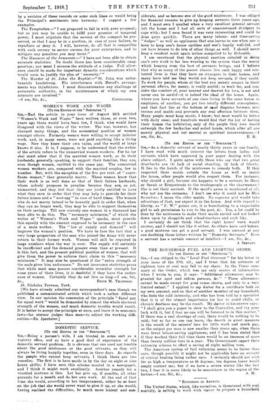WOMEN'S WORK AND WAGES
ITo TER EDITOR OF THE " SPECTATOR."] Sia,—Had the article in your issue of August 24th entitled " Women's Work and Wages " been written three, or even two, years ago there would have been few, I think, who would have disagreed with the views of the writer. The war, however, has changed many things, and the economical position of women amongst others. Formerly women were willing to accept inferior work, and, in many cases, were not paid anything like a living wage. Now they know their own value, and the world at large knows it also. It is, I suppose, to be understood that the writer of the article refers to the unmarried women workers. For he (or she) must allow that if the married women work, as do their husbands, generally speaking, to support their families, they are, even though women, entitled to the same pay. The unmarried women workers are, compared with the married couples, few in number. But, with the exception of the five per cent. of " super- fluous women," they generally marry. These women know that their work is as well done as that of their future husbands, Whom nobody proposes to penalize because they are, as yet, unmarried, and they feel that they are justly entitled to have what they earn in order that they may help to provide for their future homes and a "nest-egg " in case of hard times. The women who do not marry intend to be honestly paid in order that, when they can no longer work, they may be able to support themselves on their savings. Till now scarcely one woman in a thousand has been able to do this. The "necessary minimum," of which the writer of " Women's Work and Wages " speaks, must provide this equally with the amount supposed to be necessary in the case of a male worker. The " law of supply and demand" will improve the woman's position. We have to face the fact that a very large proportion of the men who joined the Army will never return to their former work. Women will still be required in large numbers when the war is over. The supply will certainly be insufficient and the demand greater even than at present. It is this fact, and the present political position of women, that will give them the power to enforce their claim to this " necessary minimum." It may also be questioned if the "extra strength of the male gives him endurance." Do not insurance statistics prove that while most Oleg possess considerable muscular strength for some years of their lives, it is doubtful if they have the endur- anoe of women. Certainly they do not live so long.—I am, Sir,
[We have already admitted our correspondent's case though we published a communicated article which took a rather different view. In our opinion the concession of the principle " equal pay for equal work " would be demanded by almost the whole electoral strength of the women, and much domestic trouble would result. It is better to accept the principle at once, and leave it to economic laws—far sterner judges than men—to adjust the working diffi- culties.—ED. Spectator.]


























 Previous page
Previous page